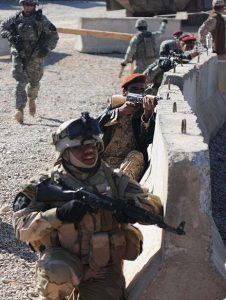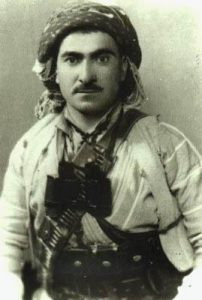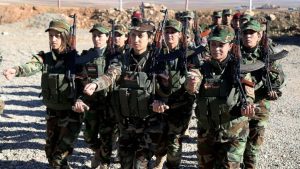- What does “Peshmerga” mean?
The word “Peshmerga” translates to “to stand in front of death”. The term dates back to the mid-20th century, and was first used by Qazi Muhammad, an Iranian Kurdish separatist leader who founded the Democratic Party of Iranian Kurdistan.
2. What do they do?
The Peshmerga are the military forces of the autonomous Kurdistan Region of Iraq. They are responsible for keeping security and military activities in the Kurdistan Region. There are other subsidiaries in the region that help maintain security, including Asayish (the intelligence agency) and Zeravani (the police/Gerdarmerie).
The Pershmerga force is controlled by two separate political parties: the Democratic Party of Kurdistan and the Patriotic Union of Kurdistan.

3. History
The Kurdish warrior tradition of rebellion has existed for thousands of years along with aspirations for independence. In fact, the Peshmerga predates Iraq. It started out as a pseudo-military border guard under the Ottomans. Later in the 19th century, it became a well-trained organization.
In 1946, under the self-declared Republic of Mahabad, the Peshmerga – led by Mustafa Barzani – became the official army of the Republic.

Mustafa Barzani was the primary political and military leader of the Kurdish cause until his death in 1979.
4. Organisation (leaders, amount of members…)
The Pershmerga force is controlled by two separate political parties: the Democratic Party of Kurdistan and the Patriotic Union of Kurdistan. There are around 100,000 fighters outside of the Ministry’s 14 brigades. Both parties (the PUK and the KDP) have separate organizational and financial structures.

5. Peshmerga and the US military
The Peshmerga played a central role in the capture of Saddam Hussein in 2003. In 2004, they also played an important supporting role in the death of Osama Bin Laden by helping capture al-Qaeda key figure Hassan Ghul.
The Peshmerga, the KRG and the United States army share security-related information about the region. This helps make the region safer and protects it from terrorist organisation.
Soldiers of the Iraqi army, Peshmerga and the 1st Squadron, 14th Cavalry Regiment react to a grenade thrown from a vehicle during a training exercise.
6. Peshmerga and the fight against ISIS
When ISIS forces starting capturing large swathes of land in Iraq and Syria – taking infrastructure and resources – the Kurdish Peshmerga mobilized. At this time, the Iraqi army fell into full retreat, so the Peshmerga forces were central in preventing the widespread take-over of ISIS.
With the ISIS onslaught, the Peshmerga have the attention of the US, regional power and other influencial actors.
Peshmerga on a T-55 tank outside Kirkuk in Iraq
7. Woman in the Peshmerga forces
The Peshmerga are also famous for having successfully integrated women into their forces. Women have served in the organization for decades. Woman were integrated into the forces in 1996, but they have been able to serve alongside the Peshmerga since the 1970s. In 1996, the first all-female unit was created, and it now has more than 500 fighters.
Before the fight against ISIS, women were mostly responsible for maintaining border security, protecting women’s shelters and providing medical and communication services. Female fighters didn’t tend to carry out combat-related duties. But with the emergence of ISIS in 2014, female Peshmerga took on more active combat roles and were a valuable asset. With the fall of ISIS, it is unclear whether their role in the army will go back to the more restrictive roles they used to take on.

Female Syrian Peshmerga fighters are being trained to fight against Daesh and Assad forces at a camp located in Old Mosul region of the city of Nineveh, Iraq, Dec. 9, 2015.
Sources:
https://thekurdishproject.org/history-and-culture/kurdish-nationalism/kurdish-peshmerga/
https://www.bbc.com/news/world-middle-east-28738975
https://www.washingtoninstitute.org/policy-analysis/peshmerga-female-fighters-frontline-sideline
https://www.clingendael.org/pub/2018/fighting-for-kurdistan/2-the-evolution-of-the-peshmerga/

